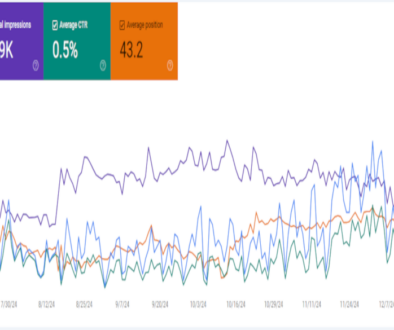Using Generative AI to Create Content: Pros and Cons Revealed!
Creating top-notch content has always been a challenge, right? Now imagine tools that could whip up articles in seconds—sounds like a dream for any busy creator. Today we’re diving into the world of generative AI, revealing its potential perks and pitfalls as your next writing assistant.
Stay tuned to unravel this digital conundrum!
Key Takeaways
- Generative AI can produce content quickly, but it’s hard for people to tell it apart from human – a recent study by Authorityhackers shows that 65.8% of readers get confused between the two.
- Ethical issues like originality and misinformation are big concerns with AI – created content, as well as possible legal troubles over copyright infringement.
- If websites don’t show that real experts wrote their content, search engines might penalize them by dropping their rankings or online visibility.
- Using generative AI demands a balance: companies can improve SEO but must avoid shortcuts focused only on rankings and ensure quality stays high through human review.
- Creating strong content requires research, knowledge of SEO principles, checking for plagiarism, understanding audience needs, and being clear about whether humans or AI made the content.
AI-Generated Content: The Ethical Concerns
As we navigate the exciting realm of AI-generated content, a storm of ethical considerations looms on the horizon. From authenticity to intellectual property rights, these concerns compel us to scrutinize how artificial intelligence is reshaping our understanding of originality and trust in the digital landscape.
Difficulty in distinguishing AI-generated content from human-written content
Recognizing the difference between AI-generated content and human writing is becoming a real challenge. Recent studies show that about 65.8% of people believe AI-produced articles are as good as, or even superior to, those crafted by humans.
Advanced algorithms like GPT-3 are now able to mimic the nuances and creativity of human language so closely that discerning one from the other without specialized tools can be almost impossible.
The rise in deceptive realism brought on by machine learning has created a minefield for readers seeking authentic information on the internet. Without clear indications of the content’s origin, it’s difficult for users to distinguish between what’s been penned by an experienced writer with genuine expertise and what’s been churned out by a neural network trained on vast datasets scraped from across cyberspace.
This blurring line poses significant risks for copyright infringement and raises ethical questions about originality and authenticity in digital marketing.
Ethical concerns regarding originality and authenticity
Moving beyond the challenge of spotting differences between AI and human-produced text, we confront a pressing moral dilemma. The originality and authenticity of content come under intense scrutiny with the advent of generative AI like OpenAI’s ChatGPT.
Should creations spawned from algorithms be deemed authentic? This question looms large for content creators and marketers who value creative integrity.
The surge in using machine learning algorithms for text generation spotlights potential infringements on individual creativity. As AI mingles with streams of existing human-generated texts to produce new works, it raises red flags around copyright protection and ethical use.
Ethically-conscious brands must navigate these waters carefully, ensuring that every piece stamped with their name upholds standards not only of quality but also genuine originality – a tricky balancing act in this digital marketing era.
Potential for spreading misinformation and violation of intellectual property rights
Transitioning from concerns about originality, another major risk is the generative AI’s ability to spread misinformation. With 65.8% of people unable to distinguish between human and AI writing, false information can quickly appear credible, leading to widespread belief in inaccuracies.
Content created by AI lacks the critical judgment humans apply when discerning fact from fiction. As a result, unverified content could easily be taken as truth by readers and shared across social media platforms.
The surge in AI-driven content creation also brings intellectual property rights into question. Take the case where The New York Times filed a lawsuit against Microsoft over the use of copyrighted material; it signals a growing legal challenge for generative AI technologies.
Without proper oversight or clear attribution protocols, these powerful tools might produce work that infringes on creators’ copyrights—potentially without even realizing it due to gaps in algorithmic understanding of laws and ethics surrounding user-generated content versus copyrighted materials.
Amplification of biases and lack of transparency
Generative AI churns out content by learning from heaps of data. Sometimes, this data contains prejudices that creep into the AI’s output. If an AI has been fed more images of men than women, for example, it might generate visuals that skew male—inadvertently echoing gender bias in its creations.
This isn’t just about pictures; language models can also mirror skewed perspectives or discriminatory views found in their source materials.
Transparency takes a hit as well with AI-generated content. It’s tough to pinpoint where the ideas came from when a machine is doing the “thinking.” This blurs lines around who owns the thoughts and words being published online—raising red flags over copyright use and originality claims.
Content creators have to stay vigilant to avoid trampling on intellectual property rights accidentally—or worse, intentionally exploiting loopholes left by unclear attribution guidelines connected to generative technologies.
Impact on SEO and Website Penalties
Understanding the intricate dance between AI-generated content, search engine optimization, and potential website penalties is a crucial step for anyone in the digital marketing sphere looking to strike that perfect balance on their platform.
Keep reading to navigate these waters with confidence.
Evaluation of expertise, authoritativeness, and trustworthiness (E-A-T) by search engines
Search engines like Google are on the hunt for content that oozes expertise, radiates authoritativeness, and exudes trustworthiness—collectively known as E-A-T. They scrutinize your web pages for hints of credible information, especially in areas that impact people’s health, wealth, or happiness.
When you’re dishing out advice or selling products in these sensitive zones, proving your know-how isn’t just a good idea—it’s essential. Without ironclad evidence that your authors are top dogs in their field, search engines may wave a red flag and cut down on traffic to your site.
E-A-T is not just some buzzword; it’s an integral part of SEO success. Google uses this concept as a quality measure to ensure surfers get the best intel available—not something cooked up by an AI-generator with no accountability.
To stay in search engines’ good books (and SERPs), websites must showcase originality and shun any inkling of manipulated rankings through copied content or sketchy SEO tactics. If they cross the line? They face the wrath of manual actions—a real nightmare scenario where penalties can come crashing down from Google’s algorithmic skies.
Potential penalties for lack of proof of knowledgeable authors
As search engines like Google scrutinize the E-A-T of content, they also zero in on the credibility of its authors. Websites could suffer significant consequences if they fail to demonstrate that their content is created by people with appropriate expertise.
Search engine rankings can plummet, leading to a sharp decline in traffic and visibility online. This drop can directly affect a site’s ability to engage with its target demographic, impacting everything from ad revenue to customer experiences.
Google doesn’t take kindly to violations of its guidelines and may enforce manual actions against sites that don’t prove knowledgeable authorship. Such penalties are more than just a slap on the wrist; they signal a serious breach of trust in the eyes of both users and algorithms.
Maintaining transparency about who is creating your content isn’t just good ethics—it’s smart SEO strategy too. Ensuring every piece of content has a traceable line back to an expert author helps safeguard against these risks and keeps websites on good terms with search engines’ ever-evolving policies.
Issues of duplication, plagiarism, and copyright exploitation
Moving beyond just the risk of penalties for lacking expert authors, there’s a darker side to consider with AI-generated content. Duplication and plagiarism become real threats as generative AI might create material that inadvertently mirrors existing online content.
This not only undermines the originality required by search engines but also tramples on intellectual property rights. In fact, 65.8% of people may see no difference between AI-written pieces and human prose, yet when AI rehashes what’s already out there without fresh insights or added value, it can invite legal trouble like in the case of The New York Times suing Microsoft.
Moreover, copyright exploitation looms large when using AI-powered tools for creating digital marketing materials or blogs. Without clear attribution and transparency about sources and contribution from these advanced algorithms, we tread into murky waters where user privacy concerns meet genuine creativity issues.
Google’s firm stance against unoriginal content means websites could face severe SEO repercussions if they’re caught harnessing copied work as their own—punishments that echo across internet-connected gadgets less concerned with ethics than with rankings.
The Debate on AI-Generated Content
The conversation around AI-generated content is heating up, with compelling arguments on both sides shaping the future of digital expression and marketing. Critics caution against an over-reliance on technology, while proponents spotlight efficiency gains, leaving businesses to navigate a nuanced landscape where human oversight remains crucial.
Positive SEO results for companies using AI
Companies leveraging AI for content creation are witnessing a significant boost in their SEO efforts. With 65.8% of people rating AI-generated content on par with or surpassing human writing, the technology is proving to be a game-changer for digital marketing.
Using sophisticated algorithms, these companies craft articles and web pages that align perfectly with search engine algorithms. This alignment not only improves visibility but also drives organic traffic, enhancing online presence.
AI tools are adept at identifying and incorporating crucial keywords that resonate with target audiences, ensuring that content ranks higher in search results. By providing content optimized for both user intent and search engine crawlers, businesses can achieve better engagement rates and turn clicks into conversions more efficiently.
Moreover, meeting the E-A-T standards becomes manageable when AI augments human expertise to produce authoritative and trustworthy material consistently. These smart strategies position companies at the forefront of innovation while delivering tangible SEO rewards.
Google’s warning against creating content solely for search engine ranking
Google has put content creators on alert: prioritize quality over search engine manipulation. Crafting articles and blog posts with the intent of tricking algorithms can backfire spectacularly.
Such tactics may lead to penalties or even removal from search results, thwarting any hopes of digital marketing success. Sticking to Google’s guidelines is crucial for those looking to maintain a strong online presence through ethical SEO practices.
Creating top-notch content goes beyond stuffing keywords into every paragraph. True expertise shines through informative, engaging writing that resonates with human readers, not just search engines.
Strike a balance between SEO best practices and valuable information delivery to avoid falling foul of Google’s policies against artificial ranking schemes. Sites caught ignoring these warnings risk manual actions which could jeopardize their visibility across the web.
The need for human revision and review of AI-generated content
For all its efficiency and scale, AI-generated content still requires a human touch to ensure quality and relevance. While 65.8% of people may find AI content on par with human output, it often lacks the nuance and deep understanding that comes from human experience.
Machines can crunch data and mimic styles, but they don’t grasp context or engage in critical thinking the way we do. It’s up to humans to review this content, making sure it aligns with ethical standards, maintains originality, and respects intellectual property rights.
Human oversight is not optional; it’s a must for safeguarding against misinformation and biases that can creep into algorithmically produced articles. Proofreading by knowledgeable professionals helps ascertain factual correctness while adherence to E-A-T criteria elevates the trustworthiness of digital marketing strategies like SEO-focused blog posts or social media marketing material.
As we move forward with ever-advancing technology like GPT-4 and large language models (LLMs), striking a balance between automation advantages and meticulous human scrutiny will define success in the realm of content creation.
Next up: Criteria for creating solid and authoritative content—let’s explore how your strategy can stand out amidst an ocean of information.
Criteria for creating solid and authoritative content
Creating solid and authoritative content demands an understanding of both the subject matter and the audience’s needs. It’s not just about packing words onto a page; it involves strategic crafting and knowledgeable insights.
- Conduct thorough research to ensure accuracy and depth in your content. This involves verifying facts, sourcing up-to-date statistics, and referencing credible authorities on the topic.
- Engage with key principles of SEO, using targeted keywords like ‘search engine optimization (seo)’, ‘meta description’, and ‘metatags’ to improve visibility without compromising readability or value.
- Incorporate elements of natural language processing (NLP) when possible for more intuitive interactions. AI technologies like OpenAI’s GPT can assist but should be guided by human expertise.
- Employ reputable plagiarism checkers to guarantee originality. Use tools that detect AI – generated text to prevent any inadvertent slip into duplication or infringement.
- Leverage analytics to measure performance and understand engagement. This feedback allows for refinement of tactics, ensuring content resonates with the target market effectively.
- Optimize for reader experience by maintaining clarity, brevity, and structure. Prioritize points that will hook readers while delivering the promised information swiftly and succinctly.
- Infuse personality through a conversational yet professional tone. Strike a balance that captures interest without sacrificing the authoritative voice needed for credibility.
- Provide actionable guidance when relevant, giving readers clear steps or tips they can apply directly from your writing.
- Reinforce trustworthiness through transparent disclosure of AI assistance or human authorship as appropriate to maintain ethical standards in content generation.
Conclusion
As we’ve explored the terrain of generative AI in content creation, it’s clear that this technology wields both power and responsibility. It tempts with efficiency but demands mindful usage to navigate ethical pitfalls and search engine scrutiny.
Embracing AI tools can propel digital marketing to new heights, yet human insight remains irreplaceable for ensuring originality and validity. Ultimately, the choice to use generative AI hinges on a balance—leveraging innovation while upholding the standards that define quality content.
FAQs
1. What exactly is generative AI in the context of creating content?
Generative AI refers to advanced technology that uses neural networks like transformer models and generative adversarial networks (GANs) to craft content, from ad copy and blog posts on WordPress to responses from chatbots.
2. How does generative AI affect digital marketing strategies?
Generative AI transforms digital marketing by offering personalized touchpoints, creating seamless social media marketing campaigns, and enhancing search engine optimization (SEO) for better visibility online.
3. Should I worry about the authenticity of content created with generative AI?
It’s crucial to employ plagiarism detection tools since some AI-generated content may inadvertently be similar to existing materials; checking for originality safeguards against publishing potentially plagiarized work.
4. Can using generative AI compromise user privacy in any way?
When deploying Generative Ai technologies, remember to adhere strictly to privacy policies – always use gathered data responsibly and ensure personalization aligns with fair use and consumer trust.
5. Are there jobs on freelancer platforms related to managing or implementing these AIs for e-commerce or database maintenance like MySQL or MS SQL?
Yes! Freelancers with skills in TensorFlow, Stable Diffusion, or other Ai applications are sought after on platforms like Upwork and LinkedIn for various projects including ecommerce solutions and database management using systems such as MySQL or MS SQL.
6. Does this mean humans will no longer write their own advertising copy or manage SEO?
Not quite – while Generative Ai offers exciting possibilities like drafting initial ad copy ideas or brainstorming SEO strategies, human creativity remains key; final touches often require a human’s nuanced understanding of language and emotion.



